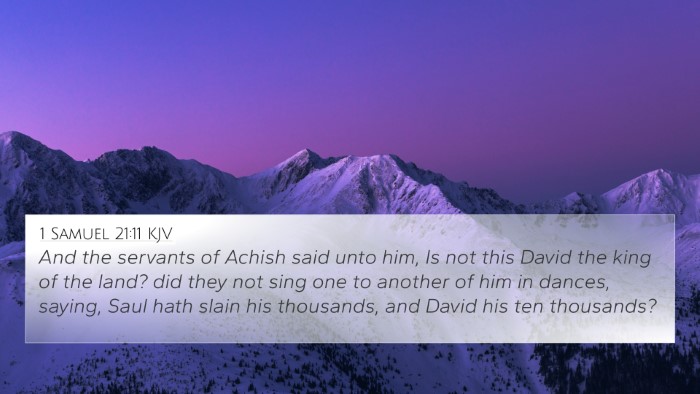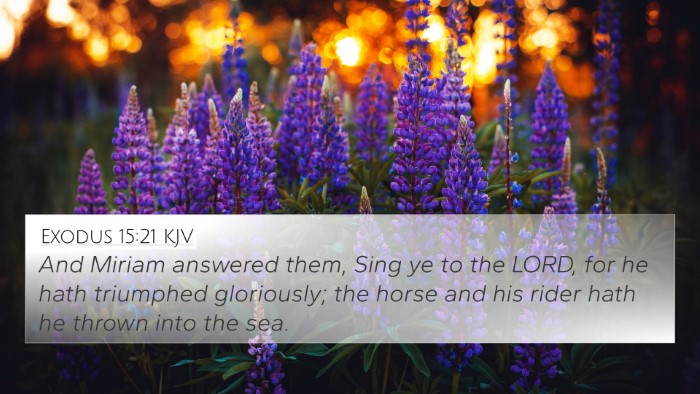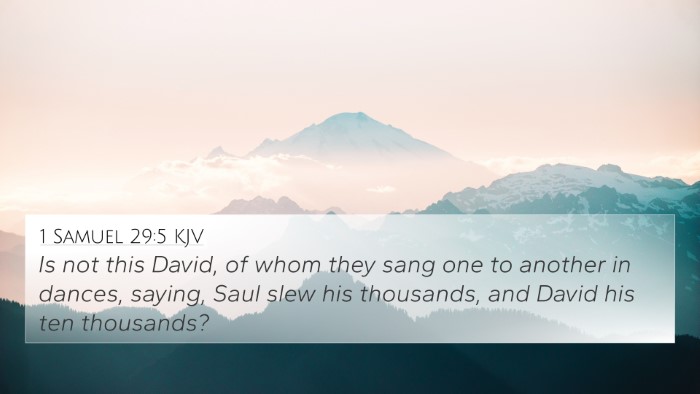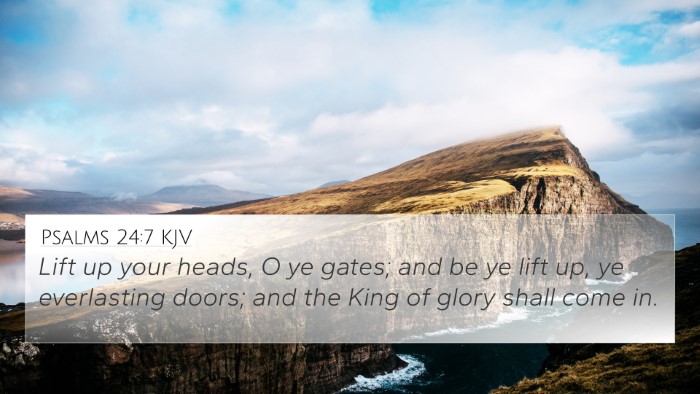Understanding 1 Samuel 18:7
Bible Verse: 1 Samuel 18:7
“And the women answered one another as they played, and said, Saul hath slain his thousands, and David his ten thousands.”
Summary of Meaning
This verse captures a critical moment in the lives of Saul and David, highlighting a transition in public perception and royal favor. The song sung by the women reflects David's rising fame due to his military successes, particularly over the Philistines, which starkly contrasts with King Saul's accomplishments.
Insights from Public Domain Commentaries
- Matthew Henry: He emphasizes that this verse illustrates how God can raise a humble shepherd boy to prominence, causing envy among those in power. The women’s song indicated not just David’s success but also foreshadowed the inevitable tension between him and King Saul.
- Albert Barnes: Barnes points out the public's reaction to David's victories and the implications of Saul's diminishing status. The contrast between the two men reflects the changing favor of God, signifying that David was chosen to lead the nation of Israel, while Saul’s reign was marked by decline.
- Adam Clarke: Clarke focuses on the cultural context of songs and praises. He suggests that the song represents a communal narrative, a means of reinforcing David’s image as a hero, thus influencing the people’s loyalty and perceptions about both David and Saul.
Thematic Connections
This verse not only signifies a turning point in Saul and David’s relationship but also opens discussions on themes of jealousy, divine favor, and the nature of leadership. Saul's response to this song reveals greater themes of human emotion, fear of loss of power, and the inherent rivalries in leadership.
Cross-references to 1 Samuel 18:7
- 1 Samuel 10:20-24: Saul’s initial selection as king highlights his humble beginnings.
- 1 Samuel 16:12-13: The anointing of David signals God’s choice for the next king.
- 1 Samuel 17:45-47: David's triumph over Goliath showcases his faith and courage.
- 1 Samuel 18:9: Saul’s jealousy begins immediately after this song, demonstrating the tension between the two characters.
- 1 Samuel 19:9-10: Further implications of Saul’s jealousy and the pursuit of David are illustrated here.
- Proverbs 27:4: This verse illustrates the destructive nature of wrath compared to love.
- Matthew 20:16: The last shall be first—relating to the theme of unexpected leaders.
Comparative Analysis of Related Verses
When examining 1 Samuel 18:7, we find numerous connections that deepen the understanding of God’s purpose and the complexities of human emotions:
- Psalm 23: Relates to David’s character as a shepherd, which is foundational to his later role as king.
- Philippians 4:11-13: Reflects on contentment and strength in various circumstances, akin to David's reliance on God.
- Luke 1:52: Illustrates the theme of God’s role in uplifting the humble and casting down the proud.
How to Use Cross-references in Bible Study
Understanding how to find and utilize cross-references can enhance your study of 1 Samuel 18:7 by revealing deeper insights and intertwined stories that the Bible presents:
- Bible Concordance: Use a concordance to find related terms and themes throughout scripture.
- Bible Reference Resources: Utilize Bible study guides that offer thematic explorations of verses.
- Cross-reference Bible Study: Engage with the scripture by noting similarities, themes, and messages found in cross-referenced passages.
Conclusion
1 Samuel 18:7 serves as a poignant moment that marks not only the rise of David but also the beginning of Saul’s internal conflict and decline. Through a close examination of this verse and its cross-references, one can appreciate the depth of Biblical narratives and the interwoven destinies of its characters. These connections enrich our understanding and reflection on God's overarching plan throughout scripture.






